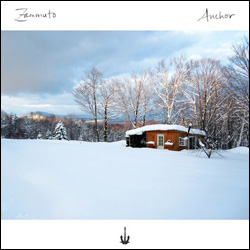 Nick Zammuto is no stranger to the ethereal. Since he started working under his surname, he has delved into copious amounts of atmospherics. Physically, the former member of The Books has resided in a home recording studio in rural Vermont that he largely built himself (presumably the snowed-in shack on his latest’s cover), and the locale may have shaped the sonic space on his self-titled debut and his new album, Anchor (Temporary Residence Ltd.), as they also feel comfortably homegrown. On Anchor, physical acts become manipulated sounds, like the drop of a needle on a vinyl record becoming the percussive basis on “Great Equator.” The album’s textures are distantly familiar, sinking the listener in otherwordly sounds while keeping a grounded foot in our dimension.
Nick Zammuto is no stranger to the ethereal. Since he started working under his surname, he has delved into copious amounts of atmospherics. Physically, the former member of The Books has resided in a home recording studio in rural Vermont that he largely built himself (presumably the snowed-in shack on his latest’s cover), and the locale may have shaped the sonic space on his self-titled debut and his new album, Anchor (Temporary Residence Ltd.), as they also feel comfortably homegrown. On Anchor, physical acts become manipulated sounds, like the drop of a needle on a vinyl record becoming the percussive basis on “Great Equator.” The album’s textures are distantly familiar, sinking the listener in otherwordly sounds while keeping a grounded foot in our dimension.
In comparison to The Books, Zammuto is often depicted as utilizing conventional songwriting. But while that seemed certain on <i>Zammuto</i>, <i>Anchor</i> strays from that template. On “Hegemony,” a pair of verses bookend a syllabic chorus chant of the title. The only differentiation in “Need Some Sun”—the “Going to California” song of the record—is the vocal melody pinned above bassist and brother Mikey Zammuto’s relentless bassline. It becomes increasingly apparent that Nick Zammuto’s actual words often take a sort of back burner on the record. As such, <i>Anchor</i> becomes a study in subtle nuance.
<i>Anchor’s</i> resounding tones make for a cerebral experience. Even when the album becomes repetitious—and its rhythm section does so frequently—the created entrancement allows all of the minute qualities to become more apparent. The spacey motif of “Good Graces” runs through the entirety of the track, but cuts out a minute before its end as vast swaths of bass tone and feathery lines from Snowblink’s Daniela Gesundheit creep in. “Your Time” has a similar timbre, though it’s backed with an outright beautiful, lonesome melody from Zammuto that recalls “Idiom Wind” from the debut. It reverberates as if played in a cathedral.
Zammuto excels in crafting heady music, though that’s not exactly what <i>Anchor</i> is completely. “IO” is full of swirling, Head Hunters–style rhythms and Jack White–channeling vocals. Album closer and aptly titled “Code Breaker” has a loading screen feel, almost like an organic piece of vaporwave. These are clear standouts, and undoubtedly “IO” will garner most of the album’s recognition. But Zammuto seems more interested in diving in to waters slowly and treading without trying to make a big splash.

Your Comments